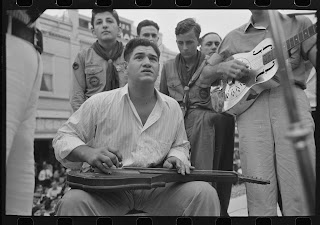He traveled to Chicago twice in 1929 to record for Paramount Records; first time with guitarist Milton Pitre and the second time with guitarist Roy Gonzales and fiddle player Anthony Bertrand. At the time, Pitre would have been around twenty. In a macabre echo of the murder of Mayeus La Fleur, just a few weeks after this recording debut, Pitre was shot dead in an argument over a woman. John and Milton are most known for the song "The Rabbit Stole The Pumpkin" which would influence two more well-known songs in years to come: Iry Lejeune's "I Went To The Dance" and Lawrence Walker's "Johnny Can't Dance".
Tout autour des "tanks" d'eau après attend' pour un train,De mille miles de chez moi dans une place qu'est bien vilain.J'ai monté de voir le conducteur, j'lui ai fait deux ou trois pas,Il m'a dit si tu as d'l'argent, je vois que tu marches pas.J'ai pas cinq sous dans ma poche, j'ai rien que j'peux montrer,Tu peux descendre mon vieux bougre, il m'a fait me dépêcher.(Yodel)Ils m'ont fait descendre dans l'Texas, une Etat que j'aime bien,J'ai r'gardé autour de moi, mais j'voyais pas le train.Personne ne voulait pas y me donner un coup d'main,Tu t'en sors (?) mon vieux hobo, dépêche prend ton ch'min.En poche mon livre était bien vide et mon cœur était en peine,J'suis mille miles de chez moi pour attendre toujours un train.(Yodel)
 |
| John Bertrand |
All around the water tanks, I'm waiting for a train,
A thousand miles from home in a place that is very shabby.
I came up to see the driver who was two or three steps away,
He said "If you got money, boy, I'll see that you don't walk",
I don't have five cents in my pocket, I have nothing to show,
"Get off old chap!" He made me leave quickly.
(Yodel)
They made me go down to Texas, a state that I like,
I looked around me, but I could not see the train,
Nobody wanted to give me a helping hand,
You go away, old hobo, hurry along,In my book bag was empty and my heart was in pain,I'm a thousand miles from my house forever waiting for a train.(Yodel)
How the two came to work together is unclear but from the two numbers included here, the partnership appears to have worked well. During this second and final recording session, John and Roy record the song "Attendre Pour Un Train" for Paramount (#12762). The song is a Cajun french verison of Jimmie Rogers' "Waiting For A Train". Roy, a native of Crowley, Louisiana, was good friends with fiddler Leo Soileau. It's possible the fiddle player on this song is Leo however, it's still unknown. They would later team up, travelling together with Moise Robin to record for Paramount in Richmond, Indiana during the summer of 1929. During this session, Roy would re-record "Attendre Pour Un Train" (#12807), this time, by himself.
- Cajun Breakdown : The Emergence of an American-Made Music By Ryan Andre Brasseaux
- http://www.venerablemusic.com/catalog/TitleDetails.asp?TitleID=11576
- http://www.yazoorecords.com/2042.htm
- Photo by Malcom V
- Lyrics by Ericajun and Marc C
John Bertrand / Blind Uncle Gaspard / Delma Lachney Early American Cajun Music (Yazoo, 1999)
















